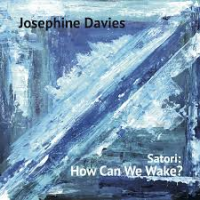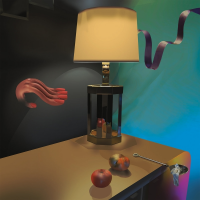Home » Jazz Articles » Album Review » Josephine Davies: How Can We Wake?
Josephine Davies: How Can We Wake?
Straight out of Europe's hippest jazz-scene, London-based saxophonist Josephine Davies's third effort with her trio, Satori, offers a collage of melodic meditations that simultaneously defy and conform to their rhythmic and harmonic frames. As All About Jazz's Chris May very fittingly puts it in an extensive conversation with the saxophonist, unlike many of her UK-based contemporaries, Davies' brand of jazz isn't made up of dancefloor grooves or Afro-infused beats, but instead searches for innovation in the Far East, specifically in Japan and Buddhist traditions. The result of her endeavors takes shape in organic trio interplay and subtle conversations based around the playful use of pentatonic material and Gypsy scales in a constant game of call and response with an alert rhythm section.
When Davies, James Maddren (dr) and Dave Whitford (b) aren't directly (and expertly!) quoting Ornette Coleman, as on "Mudita: Joy," the trio takes on a unique sound of its own. Between deconstructed balladry ("Ananda: bliss"), narrative solo excerpts ("Sutra 1," "Sutra 2" etc.) and multi-themed grooves filled to the rim with punchy rhythmic backing and soloist saxophone bliss ("Dukha: pervasive dissatisfaction," "Klesha: affliction"), the trio consistently searches for a melodic fragment to hold on to and develop, be it on sax, bass or drums. Maddren's gaze is holistic and sensitive for any possible cue from sax or bass, reacting even to the smallest change in the air and thereby elevating the drums' role to that of melodic counterpoint. Relying only on a few notes and intervals, Whitford's bass holds down the foundation in a minimal yet rigorous way,and adds to the liveliness of the compositions by shifting patterns through the bars with deceiving sleights of hand.
On "Sutra 3" Davies takes the time to expand on a motif all on her own, in a roughly two-minute-long introduction to the subsequent composition. During this display, she is able to demonstrate the entire breadth of her musical prowess. Her ease with time, the way she finds the modality of the upcoming tune and then playfully reinforces it until the rest of the band joins in, speak to her exceptional skill and prove of a matureness many can only wish to aspire to. Not quite as extroverted as Dewey Redman's nor nearly as mellow as his son's, Davie's tenor navigates through the room with fluency but always ready to cut a corner closely, just in case something more interesting is hiding around the other bend. A dry but robust tone prevails.
How Can We Wake? sounds more mature and more conceptually stringent than its predecessors, skillfully balancing humble restraint with explosive virtuousness. Satori's first self-titled effort sounded promising and its follow-up In the Corners of Clouds (Whirlwind Recordings, 2018) intriguing. How Can We Wake? finally represents the arrival at the destination and there's no knowing how much the destination offers to explore. One can only hope plenty.
Track Listing
Ananda: bliss; Sutra 1; Duhkha: pervasive dissatisfaction; Sutra 2; Nirodha: the possibility of liberation; Mudita: joy; Daya: compassion; Sutra 3; Klesha: affliction; Ananda: bliss (reprise).
Personnel
Additional Instrumentation
Josephine Davies: tenor saxophone (1-6, 9, 10), soprano saxophone (7, 8).
Album information
Title: How Can We Wake? | Year Released: 2020 | Record Label: Whirlwind Recordings
Tags
PREVIOUS / NEXT
Support All About Jazz
 All About Jazz has been a pillar of jazz since 1995, championing it as an art form and, more importantly, supporting the musicians who make it. Our enduring commitment has made "AAJ" one of the most culturally important websites of its kind, read by hundreds of thousands of fans, musicians and industry figures every month.
All About Jazz has been a pillar of jazz since 1995, championing it as an art form and, more importantly, supporting the musicians who make it. Our enduring commitment has made "AAJ" one of the most culturally important websites of its kind, read by hundreds of thousands of fans, musicians and industry figures every month.























